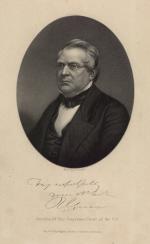Claudius Berard (1786-1848)
Claudius Berard was born in France in the port city of Bordeaux on November 21, 1786. Of a relatively wealthy family, he received a classical education and when his conscription order came to enter the Napoleonic armies his father purchased for him a substitute. This substitute was later killed in the Peninsula Campaigns in 1805. Whether or not this influenced his decision to leave France is unclear but he did arrive in New York in early 1807. Some time soon after he arrived in Carlisle and enrolled at Dickinson with the class of 1812. In 1810, his superior capacities in Latin and Greek, along with his capability and interest in modern languages, found him engaged at the College as a "teacher" of French and some Spanish - this was, at last, Rush's "long wished for" completion of the curriculum to include modern languages.


